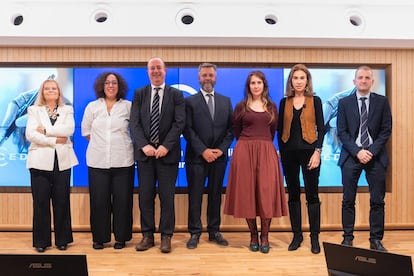What artificial intelligence does seems like magic, but it is actually the result of data collection that technology companies have used for years to power their systems. Spaniards blame this model for contributing to the creative devaluation of publishing by democratizing the unauthorized use of protected content, according to the report by the Third Observatory of Sustainability of Written Culture. The study, presented this Thursday by the Spanish Center for Reprographic Rights (Cedro) – the main Spanish association that manages copyright in the publishing sector – reveals that 72.7% of those surveyed believe that public administrations prioritize technological interests over cultural ones.
“AI does not create,” says Carme Riera, president of Cedro, “it trains with texts without permission from those who write or disseminate them.” Riera has assured that the situation has worsened, not because artificial intelligence is bad, but because “it produces content under the appearance of being original when it is not.” “This is concerned with sustainability,” he stated. The report shows that 73% of users use pre-existing content in their promptswhich implies that much of the materials used to train AI are copyrighted.
The study also reveals a significant information deficit on copyright. Héctor Jiménez, executive director of Qbo – the consulting firm in charge of preparing the report – assures that the conflict is in the use and that 67.6% of the participants consider that there is a lack of information on this matter. While 89% urgently demand a better explanation of both the positive factors associated with the protection of intellectual property and the negative effects that technology can cause on cultural creation. Jiménez has launched another dart at the public of the Ortega-Marañón Foundation in Madrid: “If you don’t act, how can you protect yourself?”
Citizens consider that institutional exemplarity is key. Almost the majority (96%) state that compliance with copyright by Administrations is more important than that of technology companies. Among the practices that affect the sustainability of written culture are plagiarism or the reuse of editorial content without authorization or remuneration, such as copies in institutions; the distribution of clipping of press or the use of works to train artificial intelligence, indicated by more than 75% of those surveyed. These practices reduce the value of the works and generate uncertainty about the future of the publishing sector. The impact on authors, explains the director of Qbo, is in generating creative poverty, absence of innovation and originality in the absence of protection.
One of the problems is that “AI has been humanized to generate trust or empathy,” said Jorge Corrales, general director of Cedro: “It is not innocent, by attributing human traits such as voice and tone, the positive bias increases.” Only half of the population thinks that it represents a high risk for society, especially due to information manipulation and the loss of critical thinking. “It is not about stopping innovation, but about giving it direction, and guaranteeing that technological progress is not built at the expense of the precariousness of those who create,” concluded Corrales.
The event concluded with a debate between the writers Carmen Posadas and Najat El Hachmi together with Jesús Badenes, general director of the Editorial Division of Grupo Planeta. Badenes defended that written culture is a pillar of democracy and that “laws must protect the rights of creators”: “AI will not replace talent. Even if we tell you to write a novel in the style of Borges, you will not be able to match it. Artificial intelligence has a very secondary role in the creation of new content or in a good translation.” Meanwhile, Posadas is confident that the word will survive: “It has survived everything: tyrants, the burning of books in different times, technology and I think it will do so now. We have time to put a stop to it.” Finally, El Hachmi recalled that this is a “mythification”: “Intelligence is only human. The correct way to say it would be technology companies that use works of authors to generate content… They have even beaten us in language,” he laments.

